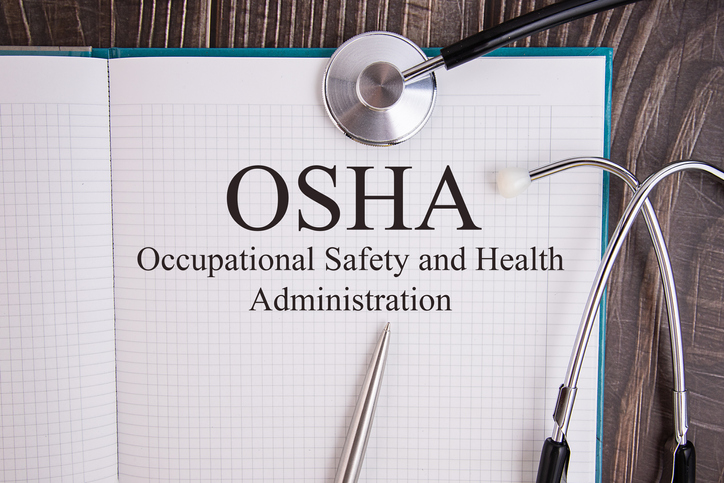The Biden administration mandate requiring all companies with 100 or more employees to have their workforce either fully vaccinated or undergo weekly testing for COVID-19 and mandatory mask-wearing, has run into legal obstacles.
In response to the persistence of COVID-19 Delta variant cases, the White House in September instructed the Occupational Safety and Health Administration (OSHA) to write a regulation, known as an emergency temporary standard (ETS), containing the workplace requirements. OSHA issued its proposed six-month vaccine-or-test ETS on November 5, to take effect in January 2022. A slew of states, businesses, and religious organizations quickly filed lawsuits arguing that OSHA lacks the authority to impose such a far-reaching rule.
On November 12, the 5th U.S. Circuit Court of Appeals in New Orleans ordered a temporary halt to the OSHA rule, saying it was “fatally flawed.” OSHA announced on November 17 it was suspending work on its ETS until the legal dispute was resolved.
“While OSHA remains confident in its authority to protect workers in an emergency, OSHA has suspended activities related to the implementation and enforcement of the ETS pending future developments in the litigation,” the agency said on its website.
State Action Against Mandates
Several states have taken action to block the mandate. For example, the Education Committee of the New Hampshire state House of Representatives approved a legislative amendment aimed at blocking any federal or state vaccine mandates on November 17, and it is expected to be adopted by the full House in early January.
“This unnecessary mandate is trampling on state powers and local private companies; imposing a new burden on employers when they can least afford it: it is a violation of personal rights and makes life difficult for the unvaccinated who want to work in an economy which already has too few workers, said state Rep. Rick Ladd (R-Haverhill), in a statement.
In addition, the Kansas Legislature passed a bill requiring businesses to provide wide-ranging exemptions to vaccine mandates and making people who lose their job due to vaccine mandates eligible for unemployment benefits. Kansas Gov. Laura Kelly (D) is expected to sign the bill. “It is too late to impose a federal standard now that we already have developed systems and strategies that are tailored to our specific needs,” Kelly said in a November 5 statement (see related article, and commentary).
Supreme Court Bound?
The Biden administration asked the Cincinnati-based 6th Circuit Court of Appeals to reinstate the mandate.
“Delaying this standard would endanger many thousands of people and would likely cause many lives per day,” Justice Department lawyers argued in their November 23 filing. “With the reopening of workplaces and the emergence of the highly transmittable Delta variant, the threat to workers is ongoing and overwhelming.”
All lawsuits opposing the Biden mandate have been consolidated in the 6th Circuit, which “can revoke, modify, or extend that stay,” said Lisa Gates, vice president for communications at the Buckeye Institute, one of several groups seeking a decision by the full court.
Employers Seek Relief
Buckeye is taking legal action on behalf of two employers, Phillips Manufacturing & Tower in Shelby, Ohio, and Sixarp, in Grand Rapids, Michigan. Phillips claims it is struggling since the pandemic to fill jobs and the order creates burdens on employees who must work long hours to fill employment gaps.
Phillips tested all employees for antibodies to COVID-19 and determined a significant number of unvaccinated workers had natural immunity. Phillips says the rule will cost the company $1 million in the first year.
“Complying with OSHA’s vaccine mandate and testing requirements risks catastrophic financial consequences,” wrote Angela Phillips, the CEO of Phillips and Shelby Welded Tube, in RealClearPolicy on November 11.
Where’s the Law?
There is no basis in law for OSHA’s mandate, says Paul Larkin, a senior legal research fellow at the Meese Center for Legal and Judicial Studies, Institute for Constitutional Government at The Heritage Foundation.
“The Biden Administration has not found a statute using the terms ‘vaccination’ (or a cognate term) or ‘immunization’ (ditto) that empowers a federal official to demand that nongovernmental parties be vaccinated,” said Larkin.
In September, White House Chief of Staff Ron Klain indicated what the administration is up against in court. In a tweet, he called the vaccine mandate the ‘ultimate work-around.”
Silence Makes the Point
A statute granting power for the mandate would designate the official and the institution, such as the Department of Health and Human Services, the Food & Drug Administration, or the Centers for Disease Control and Prevention, that could implement it, says Larkin.
“If there were such a federal law, either the HHS Secretary, the FDA Commissioner, or the CDC Director would possess that authority,” said Larkin. “That the president did not order one of those officials to impose a nationwide vaccination requirement is proof that Congress has never given the president or one of his lieutenants that power. Sometimes the dog that does not bark makes a point quite loudly.”
Whichever side loses in the 6th Circuit is likely to appeal to the Supreme Court. If the Supreme Court decides to take up the case immediately, a final ruling could be forthcoming within a few weeks.
Bonner R. Cohen, Ph.D., (bcohen@nationalcenter.org) is a senior fellow at the National Center for Public Policy Research.
This article was updated on December 9, 2021.
